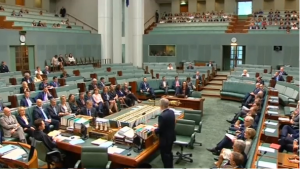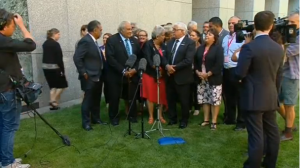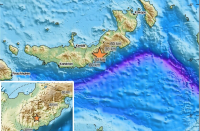CANBERRA, Australia (Reuters) — Australian Prime Minister Malcolm Turnbull on Wednesday (February 10) said that the government was failing to meet a number of goals aimed at improving the lot of its embattled aboriginal population as he released its tenth annual report card on indigenous issues.

Just two of seven targets in the 2016 Closing the Gap report, which outlines the government’s record in meeting its own targets on issues such as infant mortality, life expectancy and economic performance, are on track to be met.
The report found that the imprisonment rate for indigenous adults in Australia rose by a staggering 77 percent between 2000 and 2015. Aborigines comprise just three percent of the population but make up 27 percent of those in prison.
A target to close a 10-year gap in life expectancy between indigenous and non-indigenous Australians by 2031 is not on track and the aboriginal unemployment rate will not be halved by 2018 as previously pledged.
Turnbull called on the country to do better and improve the lives of Aborigines and Torres Strait Islanders.
“A person’s right to shape their own identity and for that identity to be respected is central to the well-being of all people. And yet, for decades, aboriginality and skin color has been used to control the lives of indigenous people and diminish their value in society. This must be no longer,” Turnbull told parliament.
Australia rarely talks publicly about the condition of its roughly 700,000 indigenous citizens, who track near the bottom of its 23 million citizens in almost every economic and social indicator, or about society’s attitude toward them.
“It is time for governments to do things with aboriginal people not do things to them. Now we are the most successful multicultural society in the world, the glue that holds us together is mutual respect, a deep recognition that each of us is entitled to the same respect, the same dignity, the same opportunities.”
“Closing the Gap is more than another government indigenous policy, it speaks to all of us and it speaks about all of us, it is our best selves, our deep, just fair values given practical form,” added Turnbull.
Last year months of relentless booing of aboriginal football great and anti-racism campaigner Adam Goodes ignited an uncomfortable public debate about race and how Australia treats its indigenous citizens.

A referendum to recognize Aborigines in the constitution has been on hold for years.
The Closing the Gap report struck a somber tone as it outlined a litany of grim statistics highlighting the difficulties facing these communities.
“Governments can’t solve the health crisis that we have, that’s got to be done with and by aboriginal and Torres Strait islander people, governments are there to help facilitate that process and we heard very clearly from the Prime Minister and the leader of the opposition that they’re keen to take it on. It’s about mutual respect,” said indigenous leader, Tom Calma.
Aboriginal and Torres Strait Islander men and women are more likely to be hospitalized for family related assault than non-indigenous Australians, it said, 28 times more likely for men and 34 times more likely for women.







